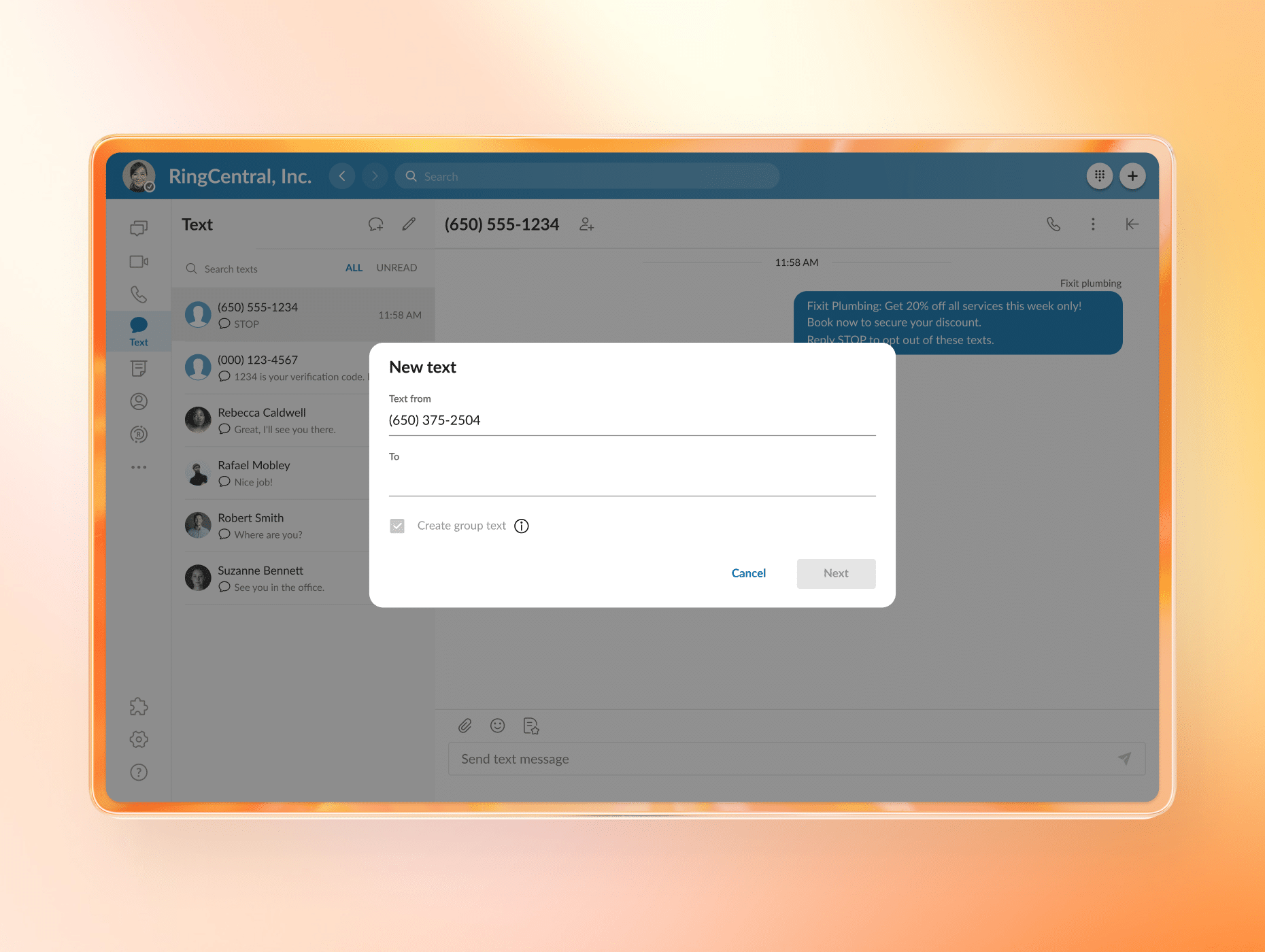If you run a small company but haven’t yet discovered the value of business text messaging, you should consider what SMS can do for you.
Phone, email, and even video have become go-to channels for sales and marketing, and they’re all useful.
But the importance of business text messaging can’t be overstated—especially for small businesses. Business text messaging really could make all the difference for your business.
Think about it. Your colleagues and customers never really stop. Like all of us, they spend more time glued to their smartphones than ever. And plenty of that time is spent shopping.
At RingCentral, we’ve seen first-hand the boom of mobile communication for every type of company. And if you want to be part of it, you need a reliable business text messaging service.
What is business text messaging?
Unlike typical social text messaging, business text messaging uses instant text-based communication channels (including SMS/MMS and popular platforms such as Messenger, Skype, or WhatsApp) to serve business goals.
Whether you’re communicating with employees, marketing to promising prospects, or supporting existing customers, you can use text messaging for business to get better and faster results.
7 Top business text messaging apps for 2024: Your ultimate breakdown
We’ve put together a comprehensive list of business texting services to help you put your company in the (literal) hands of your customers. Here are the top seven business text messaging services today:
| Business text messaging comparison | Easy to use | Easy to integrate apps | Scalable | Good customer service | Budget friendly | Automated texts |
| RingCentral |
✓ |
✓ |
✓ |
✓ |
✓ |
✓ |
| EZTexting |
✓ |
✓ |
✓ |
✓ |
✖ |
✖ |
| TextRequest |
✖ |
✓ |
✓ |
✖ |
✖ |
✓ |
| SimpleTexting |
✓ |
✖ |
✓ |
✖ |
✖ |
✓ |
| Clicksend |
✖ |
✖ |
✖ |
✖ |
✓ |
✓ |
| Textedly |
✓ |
✓ |
✓ |
✖ |
✖ |
✓ |
| Google Voice |
✓ |
✖ |
✖ |
✓ |
✖ |
✓ |
🛒Shopping for a reliable, affordable business text messaging platform? Find the right one for your business with this free checklist.
Let’s first look at what text messaging for business involves and why it’s something you should be investing in.
What are the benefits of business text messaging?
If you’re skeptical about the benefits of texting for business, we completely understand.
The bulk of your company communication probably happens via phone or email, and business text messaging might seem tough between character limits and fewer face-to-face interactions.
That said, adding text messaging for business to your communications arsenal is a must-do for companies today, especially since SMS open and response rates can be as high as 98% and 45%. Here are some other key benefits of business text messaging apps to consider:
Business text messages reach further than calls and emails
Calls go unanswered. Emails get buried between messages or stuck in the “Spam” folder.
But text messages are a different story.
With the high read rate of text messages and the fact that the average person checks their smartphone a staggering 96 times per day, businesses that want to reach new customers should consider using business text messaging software if they aren’t already using it.
So many customers prefer to communicate via text
You need to be able to communicate with customers on their terms.
If your customer base features a young demographic, you really can’t ignore business text messaging.
Why so much love for texting, though? Well, texting is time-efficient. In today’s hustle-and-bustle world, time is money. Although business text messaging might not be ideal for building personal relationships with your customers, it’s a perfect channel for quick check-ins and confirmations.
Take 24 Hour Tees, for example. As their name suggests, they turn around custom T-shirt orders in an incredible 24 hours. Which means they have to be able to stay in touch with their customers around the clock.
Rather than resort to lengthy emails or phone calls back and forth, clarifications and confirmations via push notifications can do the trick. This sort of speed and accessibility provides a distinct competitive advantage to businesses working with multiple clients at once:
Business text messaging is a low-maintenance way to make sure your business is always “on”
Piggybacking on the point above, availability via SMS enables your business to be “on” at all times.
For example, a good business text messaging app enables users to confirm orders and appointments beyond business hours, once again avoiding the need for another email or customer call.
These autoresponders make your business more accessible and likewise appeal to customers who might not want to talk to anyone directly.
If nothing else, text messaging for business doesn’t have to be rocket science. Whereas email and call scripts are lengthier, character limits (~160 per text) ensure that the average business text is shorter than a Tweet.
The fact that most business text messaging solutions allow you to create and customize templates and autoresponders means that you can “set and forget” many SMS campaigns. Of course, you always have the opportunity to follow up through phone or email if necessary.
Business text messaging best practices
Having the right SMS marketing service or business texting platform is crucial. That’s why we’re going to rundown seven great options really soon.
However, there are also some best practices you can follow to get the most out of your SMS text solution, and improve things like internal communications, customer engagement, and more.
Personalize conversations
Some common business use cases of SMS messages are, by nature, bulk affairs. SMS marketing campaigns, for instance, are designed to let you quickly and easily reach a whole contact list.
Each recipient on that list, however, wants to feel like an individual and that your business treats them as such. That’s why it’s vital to leverage customer history, previous interactions, and other data to personalize messages as much as possible. The right solution should make this easy.
Choose the appropriate message cadence
Text message marketing is effective, in part, because SMS tends to have a better open rate than other channels. However, if you bombard customers or contacts with too many messages they’ll quickly start deleting your texts unread.
What’s more, some cell phone providers may mark your number as spam if they detect too many texts being sent.
That makes it critical to get the cadence of your messaging right, whether you’re deliberately embarking on a drip campaign or hoping to encourage real-time, two-way texting.
Respond quickly and appropriately
Talking of two-way texting, if your SMS communication with customers is designed to help you collaborate or offer customer support, make sure you reply in a timely and appropriate fashion.
Make sure you monitor incoming messages regularly and have a benchmark for how long they can be left without a response. Sometimes, an automated reply may be fine—particularly as a stopgap measure to acknowledge an inbound text—but ensure those messages that need a more nuanced response get one.
Use templates to streamline messaging
We’ve mentioned that personalization is important. However, you can’t realistically write every individual text message your business sends from scratch. Templates can help you to send effective messages at scale.
You can create templates for common messaging scenarios—like appointment reminders, client onboarding, customer review requests—and simply leave room for personal touches.
What makes a great business text messaging app?
Like any other type of software, companies are spoiled for choice when it comes to text messaging services for business.
Below are some key factors you should consider before you pick a text messaging service for business purposes.
Does it keep your customers’ information safe and secure?
People rightfully value their privacy. If someone hands you their phone number, they’re trusting you to keep it safe. That means no spam and definitely keeping their personal data away from hackers.
This is why businesses should be wary of tools like WhatsApp or Facebook Messenger as replacements for business text messaging. They’re designed for consumer use, not business use, and tend to be more susceptible to security issues.
Instead, you need a dedicated business texting app that’s tied to a proper business phone number. Business text messaging demands trust and credibility, and relying on consumer apps won’t protect your or your customers’ personal and financial information.
Does it give you scalable messaging that grows with your business (without breaking the bank)?
The good news for the sake of our list is that many of the services listed are budget-friendly for even smaller businesses and teams.
However, business text messaging still needs to be scalable. Once you get on board, you’re committed to sending and receiving texts from customers for the long haul. How often and how much you’re going to use text really depends on the size and scope of your business.
For example, the cost of business text messaging is very different when you’re paying for a service covering a handful of customers, compared to a service that covers hundreds or thousands. A small business might use a credit-based payment system, while something bigger might need to provide unlimited access to SMS (as is the case with RingCentral).
Either way, you need to make sure you invest in a system that suits your business and which you can afford.
Is it easy to use and does it integrate with tools you’re already using?
For the sake of saving time and money, you should use business text messaging apps that integrate with each other, rather than veering between lots of different tools.
It obviously makes sense to integrate your business text messaging campaigns with your existing communication tools (think: phone system, email marketing software). For example, RingCentral’s integrations allow you to text your customers within your email inbox, CRM, and more.
Also, you should choose a business text messaging service that’s easy to use. Tools like RingCentral make it a cinch to send texts via our desktop app, which looks like a traditional business messenger.
So, what are the best texting services for business?
Onto the good stuff! We’ve picked out seven business text messaging tools that can help you reach your often distracted, busy customers. Many of the listed business text messaging tools are easy to use and affordable for a small business.
1. RingCentral: A complete communications suite with unlimited, easy-to-integrate business text messaging built in
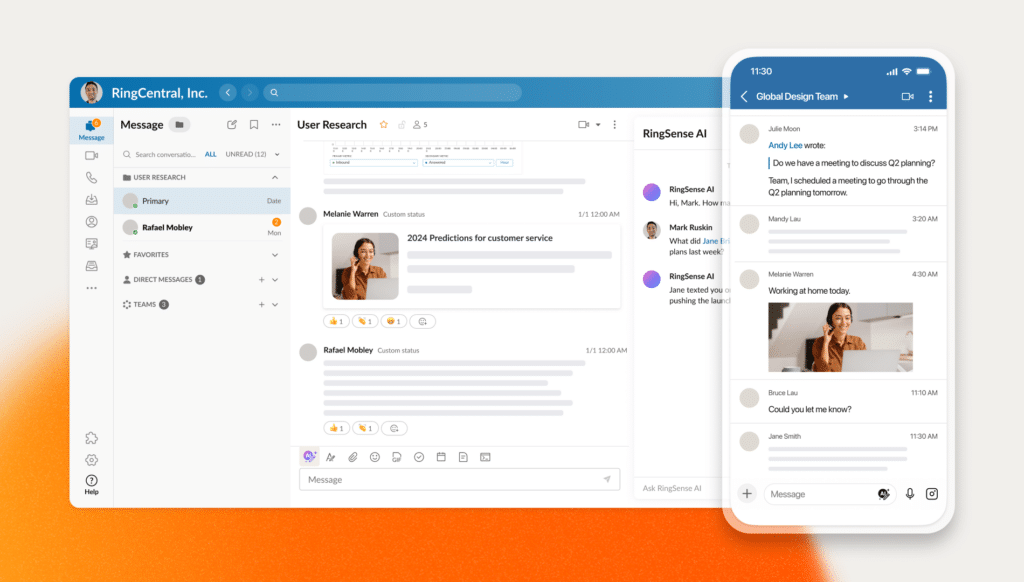
First things first: RingCentral is about much more than just texting.
The platform lets you provide omnichannel customer service, which includes phone, email, and SMS (among others) to reach your customers anywhere and everywhere:
Now onto business text messaging.
Through RingCentral, you can send unlimited texts up to 1,000 characters from a single business phone number. This includes meeting requests, files, links, and anything in between. Whether you simply want to be able to confirm meetings with clients or run full-blown marketing campaigns, you’re covered.
The biggest upside of using RingCentral is that all of your business communication is consolidated into a single platform. For example, you can track all of your text messages via your RingCentral dashboard or take advantage of our in-app integrations for your inbox or CRM.
In other words, you can instantly send and receive texts via RingCentral regardless of which business app you’re using.
For example, integrations like Trumpia Connect allow you to roll out RingCentral’s texting capabilities directly into Salesforce. Chatting with your customers via text is as simple as writing any other message on your desktop:
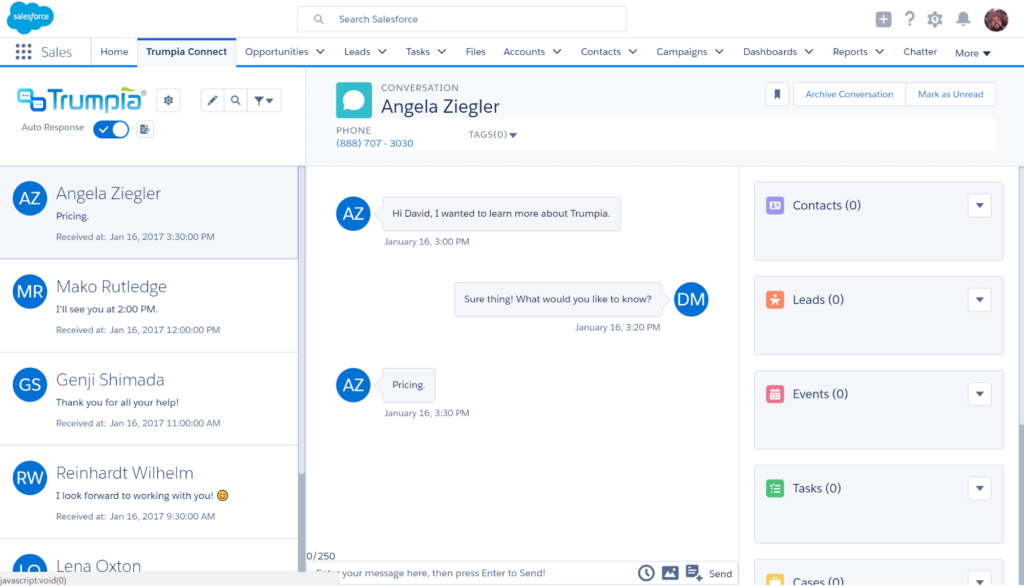
Here’s another example: RingCentral’s integration with amoCRM, which allows you to log all your customer interactions including calls, emails, and texts. This gives you a more comprehensive history of your customer relationships, all without any note-taking on your part:
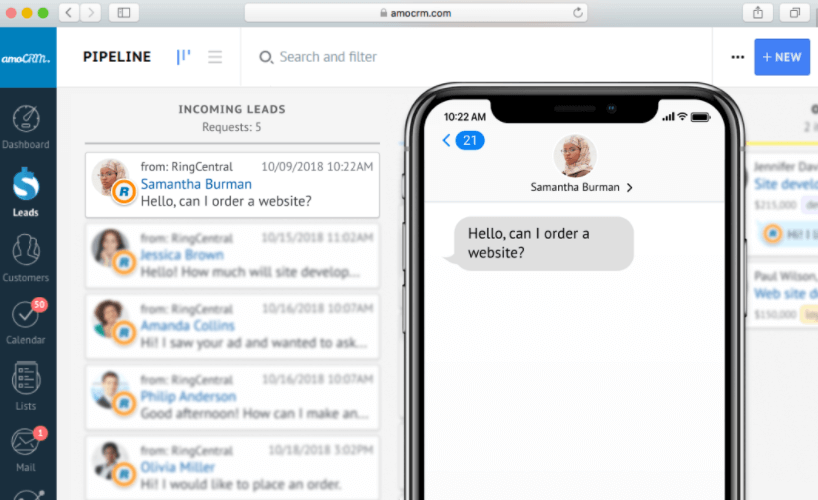
Meanwhile, tools like SalesNexus allow you to set up texting templates and autoresponders for text-based confirmation messages:
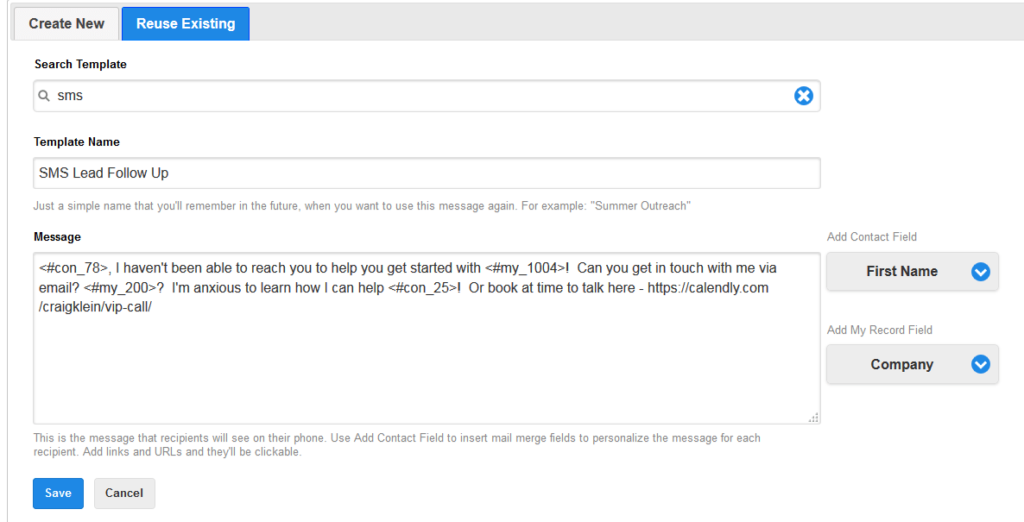
Another RingCentral benefit is that we offer unlimited business text messaging. In other words, you aren’t tied to per-message rates or pricing. If you have a large customer base, this means you don’t have to worry about exceeding your budget or rationing your texts.
Also, RingCentral is one of the best business text messaging services for your customers and colleagues. For example, you can use our platform to send internal texts to your team members. If you don’t have the time to hop on a call or write an email, why not just do a quick check-in over text?
🕹️ Get a hands-on look at how RingCentral’s robust business texting features work by booking a product tour:
💰 You can also use this calculator to see roughly how much your business could save by using RingCentral to support your team’s communication with each other—and clients.
2. EZTexting: A mass-messaging app made with marketing in mind
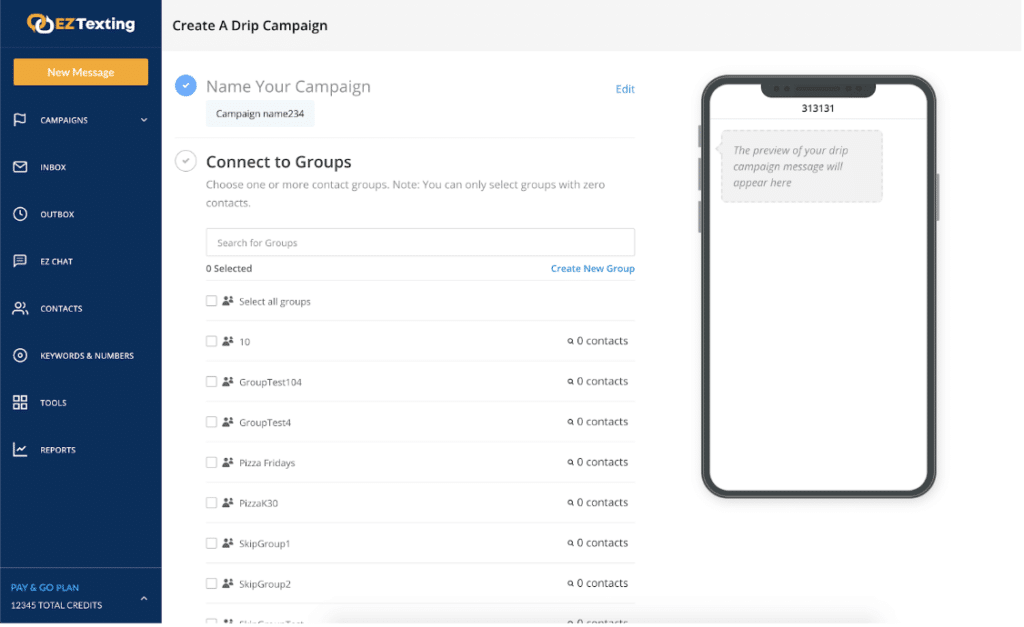
EZTexting is a mass-texting tool with features centered around marketing-based campaigns. For example, the platform allows you to set up the following within its platform in a few clicks:
- Contests
- Coupon codes
- Vouchers
- SMS-only offers
These sorts of exclusives are a great way to not only keep your customers but also encourage them to join your text messaging list. EZTexting also includes analytics and integrates well with email marketing tools, so you can see how SMS factors into closing customers.
Beyond these marketing features, you can set up automated reminders and alerts akin to ZipWhip. The platform is straightforward and offers both flexible-use and high-volume plans depending on your needs. You can also add on extra business numbers or extra messages if you’re looking for a la carte messaging features.
3. Text Request: Bulk business text messaging tailored for small service-based businesses
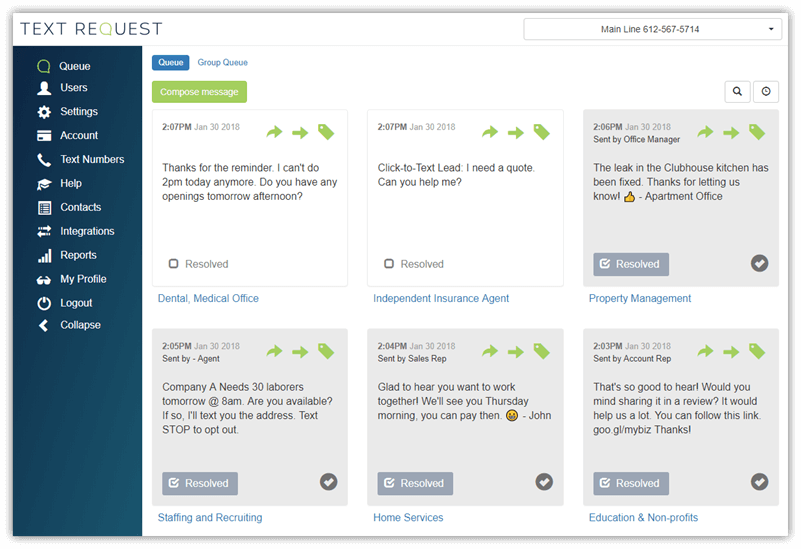
Text Request is a texting tool built for small and service-based businesses. Autoresponders and confirmation texts are standard, as is the ability to save text campaigns and create templates for later use.
One notable Text Request feature is lead generation. For example, “click to text” enables mobile customers to immediately contact your business via your website, Google ads, or Instagram profile.
This means that you can text customers directly, instead of having to reach out to them via an opt-in form. Since business text messaging for small businesses can be a tough sell when value isn’t yet proven, optimizing lead generation is a good move.
4. SimpleTexting: A sleek platform with powerful business text messaging features
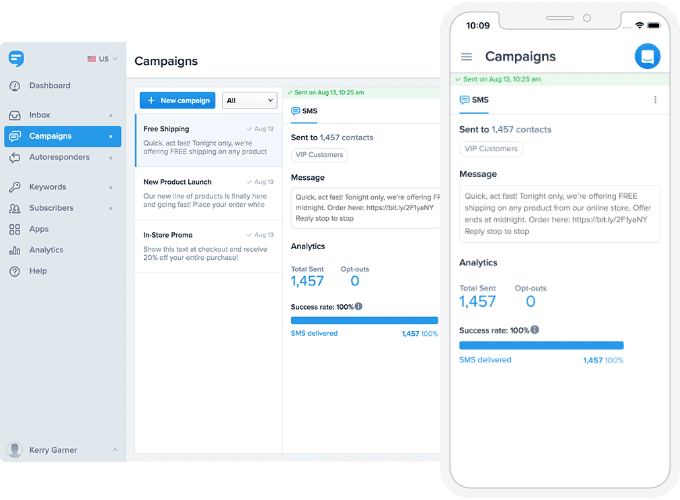
SimpleTexting lives up to its name—it provides an easy-to-use platform that gives you the flexibility to switch between one-on-one texts with customers and dedicated marketing campaigns.
Features such as scheduled texts, auto-responders, and direct customer communication via text are built in. Meanwhile, you can quickly upload your existing list of contacts to get started.
Standout features such as text-based polls, voting, and push notifications make for more meaningful business text messaging interactions with your customers. Additionally, link-tracking analytics can help you understand which interactions are working and which aren’t.
The platform’s pricing is based around purchasing “credits” for use. However, it is also technically a free text messaging service for business for up to 14 days (with 50 outgoing texts and full features to start out with).
5. Clicksend: Pay-as-you-go business text messaging for companies that need lots of flexibility
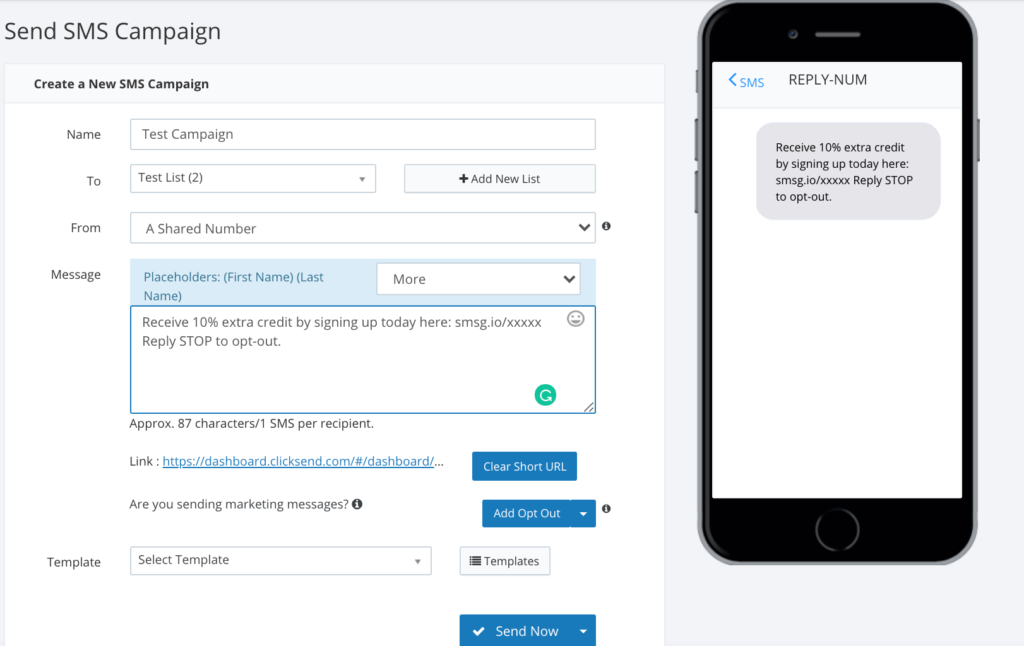
Clicksend’s platform is an “online SMS gateway” for companies looking to begin business text messaging with customers. As a pay-as-you-go business text messaging service, Clicksend is unique on our list, giving its users some flexibility in how much or how little they want to text.
Because of this, the platform makes sense for companies looking for text software for business to support simple, text-based customer service or run as-needed marketing pushes. One notable feature of Clicksend is the ability to integrate with your email marketing platform (like Outlook) to send and repurpose emails as text messages.
6. Textedly: Bulk business text messaging and reminders for small businesses new to texting
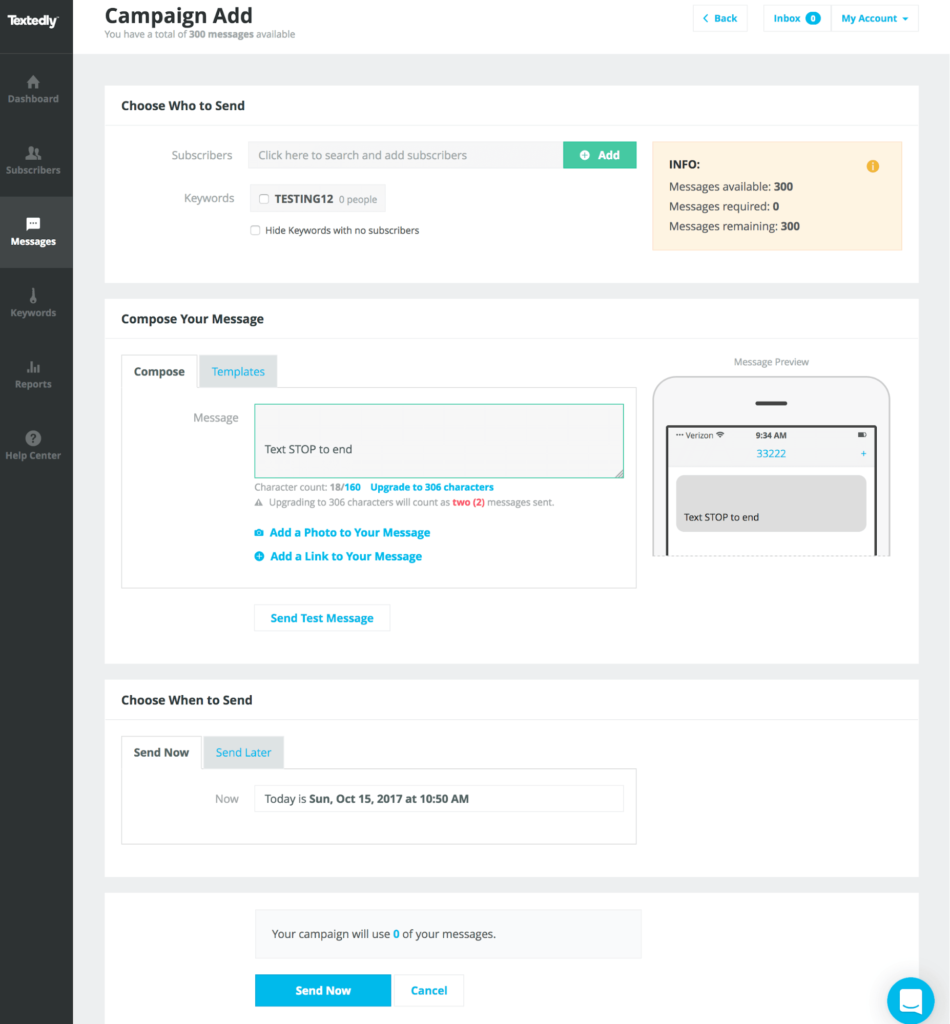
Textedly is a business text messaging platform that contains useful features like mass texting, scheduling, and automated replies— although these features are also widely available amongst the other apps on our list.
That said, the platform’s massive list of ready-made, industry-specific templates save time for service businesses. For example, appointment or reservation-based businesses can easily set up most of their text messaging for business campaigns.
7. Google Voice: A basic business text messaging service for companies already using Google Workspace
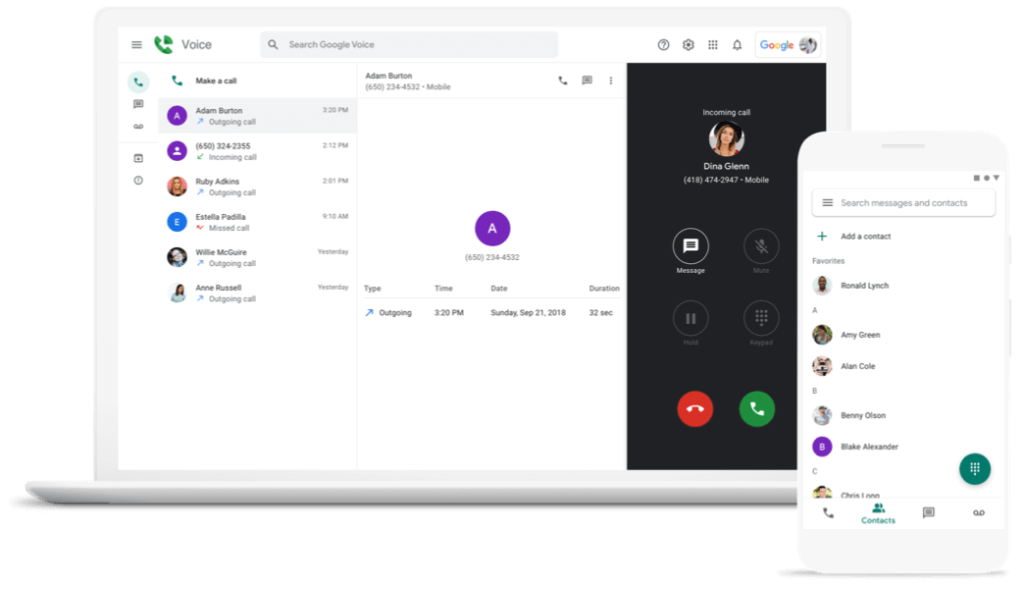
Okay, so Google Voice isn’t the most robust business text messaging tool.
However, it does provide an easy-to-use option for companies who want to be able to send a few quick texts to customers.
For example, let’s say you only have a handful of clients or your company already relies on Google’s suite of apps. If so, you may not want to pay for mass texting or running full-blown campaigns.
If you use Gmail for most of your communication, Google Voice’s business texting provides another option for you to check in with customers and keep in touch with them on the go. Texting via desktop is perhaps the bare minimum businesses should offer when it comes to mobile messaging.
Google Voice has you covered in that department. No more, no less.
And although Google Voice is limited text-wise, the fact that it’s a Google tool makes it relatively trustworthy and reliable.
Business text messaging key features
You’ve probably noticed that lots of the options listed above share similar functionality. That’s because there are some key features of business text messaging apps that any viable option simply has to have:
Automated workflows
You could simply use one or more company cell phones to send business SMSs manually. You wouldn’t, however, as it would be time-consuming and inefficient. Any business text messaging platform, therefore, must be well set up to save time and effort.
That means it should include features and functions that help you automate workflows. Perhaps, you can schedule text messages for specific parts of the customer journey (like immediately after an order is placed). Maybe, you could use AI to auto-respond to simple customer queries by text.
Simple and accessible interface
You need anyone and everyone in your business to be able to use your chosen messaging app. That means the best options all have a user-friendly interface that extends across mobile devices (Android, iOS, etc.).
This is particularly important for small businesses that may not have a team or staff member dedicated to SMS marketing campaigns or manning text support channels. When your team has to turn their collective hand to different tasks on any given day, simplicity and a shallow learning curve is a necessity of any tech solution.
Low volume requirements but scalability, too
Some business text messaging apps only become cost-effective at a very large scale. For instance, if you send hundreds or even thousands of text messages per day. That makes them inappropriate for smaller businesses, and therefore, disqualified them from our countdown.
So that smaller organizations can benefit from business texting, any app must have low volume requirements—meaning you don’t have to send a huge number of SMSs to make it viable. However, there should also be room for growth built in, so that you can send bulk SMSs if and when required.
Built-in reporting and analytics
Like all business processes, text messaging—whether for marketing, customer service, or other purposes—shouldn’t be a set it and forget it scenario. You need to keep track of what you’re doing and how well it’s working.
That’s why built-in reporting and analytics is another key feature of the best business text messaging apps. With built-in analytics dashboards, you can analyze your texting activities at-a-glance. That makes it quick and easy to pinpoint what’s going well and where there’s room for improvement.
Ease of integration with other channels and tools
Business text messaging doesn’t exist in a vacuum. It should be a seamlessly integrated part of your overall processes and workflows. As such, it’s helpful if your chosen SMS tool is equally well integrated with your other communication channels and wider business tools.
If you choose RingCentral RingEX for your business texting, for instance, that’s precisely what you get. It’s a unified communications platform which combines SMS with phone calls, video conferencing, online fax, and more—all in the same place. What’s more, over 300 native integrations and APIs make linking it up with your broader business tools a cinch, too.
Are you using a business text messaging service yet?
Texting isn’t just something businesses should offer. If you know that your customers and prospects prefer texting, then your business should make it a priority.
Why? Because mobile messaging is a key part of the customer experience these days, and business text messaging benefits are too good to ignore.With texting software for business, you can roll out and scale your mobile campaigns to reach more customers faster. Doing so is seamless with RingCentral, which allows you to manage all of your internal and external business communications in one place.
Frequently asked questions about business text messaging
How does business text messaging work?
There isn’t a huge difference between business text messaging and conventional text messaging—they use the same channels and underlying infrastructure. But there are two factors that set them apart: the systems they use to compose and distribute messages, and the scale.
A text messaging for business platform should help you to easily automate sending large quantities of messages. Notably, hooking into other systems through integrations is key to meeting this need.
For example, customer relationship management systems facilitate the use of variables, which should make it easy for you to personalize messages. Whereas compliance management systems can safeguard against the potential legal implications of sending so many messages (some now use AI to achieve compliance across communication channels at scale).
Why do you need a business text messaging app?
There are many reasons you might need a business text messaging app. You may want a marketing channel that benefits from high open rates. If you operate in the healthcare niche, you might want a reliable and effective way to send appointment reminders. Or, perhaps, you need to offer customers a support channel that they may prefer over phone calls.
Which devices can receive business text messages?
When you’re sending business text messages for marketing, your customers will typically receive them on their personal mobile devices. However, if you’re using a unified communications solution like RingEX for text-based customer support, your agents can receive texts on almost any device.
As long as they have access to the internet and their RingCentral account or mobile app, they can receive text messages sent to your business numbers—be that on cell phone, tablet, PC, or laptop.
Do businesses need consent to text customers?
The principal legislation regarding telemarketing in the USA is the Telephone Consumer Protection Act (TCPA). Under that legislation, businesses cannot contact customers with commercial or marketing intent, without prior express written consent. Having had an existing business relationship does not substitute for that consent.
1campaignmonitor.com/blog/email-marketing/2019/01/roi-showdown-sms-marketing-vs-email-marketing
2asurion.com/about/press-releases/americans-check-their-phones-96-times-a-day
3openmarket.com/resources/millennials-still-love-text
4cnn.com/2019/05/14/tech/whatsapp-attack/index.html
5theverge.com/2019/3/7/18254788/facebook-messenger-vulnerability-attack-imperva-iframe-malicious
Originally published Jun 20, 2024, updated Oct 08, 2024
